#3rd party Pathfinder
Explore tagged Tumblr posts
Text
As a way to give this blog some purpose, and give myself something to do, I’ve decided to start writing out my RPG musings in my spare time. I’ve been slowly working on a campaign setting for several years now, and it’s become a little creative space for me to hammer out a hypothetical kitchen sink to throw my fantasy ideas in. I’ll probably end up using it for a Pathfinder game (where I’ll finally get to use Spheres of Power/Might, and maybe even Guile), but I’ve thought about running it with an OSR game as well. Who knows, maybe I’ll run it over several different systems. Without further ado, here’s the first installment!
Post #1: The Ottoguard
This idea was created using Ultimate Engineering, the most recent (and final) Pathfinder product for Spheres of Might from Drop Dead Studios. I contributed a bit to the playtesting and had a great time, and its author spent two years fine tuning it, so if you're interested, go support them and take a look. At the time of writing, it should also be on the SoP wiki any day now.
In the core of the setting, the city of Scalmoor treats scientific advancement like its own fom of magic. They build marvelous contraptions of steel and glass, whether powered by tightly wound clockworks or by burning coal and spewing black smoke. In this city, the law is kept by those with the most money to build the biggest toys, and one such toy is the Ottoguard.
Standing at eight feet tall, an Ottoguard is a hollow sort of mechanical construct, but bears no magic or animating consciousness like a golem. Instead, a trained fighter pilots it, wearing it as a sort of incredibly heavy armor that carries itself. Ottoguards don’t do all of the policing, usually accompanied by a few regular guards who can do things like fit into buildings, move obstacles aside, bully civilians up close and personal, and so on and so forth.
Ottoguard CR 1 XP 400 Human Warrior 3 LN Medium Humanoid (Human) Init +2; Perception +5
Defense
AC 17; Touch 12; Flat-Footed 15; (+2 Dex, +5 Chainmail) 21 HP (3d10+6) Fort +5 Ref +3; Will +3
Offense
Speed 20ft. Space 5ft; Reach 5ft Melee Sap +4 (1d6+1 nonlethal) Ranged Light Crossbow +5 (1d8/19-20) Special Attacks Snag (Swift action, render target battered as melee touch attack)
Statistics
Str 13, Dex 15, Con 14, Int 10, Wis 14, Cha 8 Base Atk ; CMB ; CMD ( vs. trip) Feats Extra Combat Feat Skills Craft (Technology) +6, Intimidate +5, Perception +5, Sense Motive +5; Racial Modifiers Languages Common SQ Gear: Mwk Chainmail, Light Crossbow, Longsword, Large Crossbow, MwK Large Sap, Potion of CLW, 8 gold pieces, 13 silver pieces. Martial Tradition: Mechaguard* Martial Talents (2 talents from progression, 1 talent from feat)
Equipment Sphere: Bounty Hunter’s Tools Armor Training Tinker Sphere: Transportation Package Mechanical Arsenal Transportation Mastery Wrestling Sphere: (Constrictor Drawback) Hammerlock Clinch Strike
Those stats above are for if our unlucky Ottoguard pilot is caught… off-guard. They’re there to represent what’s inside the fantastic mech and what he’s trained to do in a fight, particularly specializing in nonlethal capture- even when fully kitted out he’s here to apprehend criminals, not brain them. The crossbows are just for emergencies. So let’s break down what he’s capable of as a third level warrior, namely his talents:
His Equipment Sphere talents are there solely for proficiencies, for the Sap and for medium/heavy armor. The Athletics Sphere lets him run pretty quick (five times his speed in medium armor, at a hundred feet per round)- he won’t be able to outrun most people, but he won’t fall too far behind either. Tinker is much more complex, opening up an entire subsystem, but the bulk of why it’s there is to build and maintain his precious Ottoguard, with Mechanical Arsenal allowing him to outfit it with custom-crafted plate-mail for free, and Transportation Mastery allowing him to make an immersive cockpit that responds to his movements with a complicated array of levers and pulleys. Wrestling is there so that he can tackle a criminal and, if needed, beat them unconscious. It’s alright though, because even if it’s scaled up to be sized for an ogre, a lead rod wrapped in leather will still deal nonlethal damage.
Mechanoid Statistics: 4th level Mechanoid N Large Construct Init +2; Perception +5
Defense AC 24; Touch ; Flat-Footed ; (+9 Full Plate, +1 Dex, -1 size, +5 NA) 27 HP (3d10+12) Fort +5; Ref +3; Will +3 Defensive Abilities ; Immune Construct Traits
Offense
Speed 20ft. Space 10ft; Reach 10ft Melee MwK Large Sap +8 (1d8+5, Nonlethal) Ranged MwK Large Light Crossbow +5 (2d6/19-2) Special Attacks Snag (Swift action, render target battered as melee touch attack)
Statistics
Str 20, Dex 14, Con --, Int 10, Wis 14, Cha 8 Base Atk +3; CMB +9; CMD 21 Feats -- Skills Perception +5, Sense Motive +5, Intimidate +5; Racial Modifiers SQ 6 Upgrades (Arms, Legs, Cover*, Focused Design (+2 Str), Immersive Cockpit, Armor Slot, Alternate Size) *Free upgrade Gear MwK Large Sap, MwK Light Crossbow,
The Ottoguard, while piloted, can benefit from its pilot’s skills, feats, saving throw bonuses, base attack bonuses, et cetera, while keeping its own physical ability scores, armor class, and better weaponry, while also having its own pool of hit points. The pilot isn’t totally sequestered, however, and some parts of him are still visible, even if they’re behind hatches or a visor, and he may be attacked separately from the Ottoguard- though he benefits from Cover, gaining a +4 bonus to Armor Class.
An Ottoguard isn’t cheap, of course, but by the rules of Ultimate Engineering, Project Materials (for things such as mechanoids) may be acquired freely with time and successful crafting checks (DC 15 for 50 gold worth of material, +50 for each increase of 5, gathered over the course of 4 hours per check), meaning that by carefully sourcing and repurposing parts, the Ottoguard may be constructed from scratch by its pilot for free. This process of assembly and subsequent maintenance are drilled into pilots’ heads from day one. At a cost of 500gp for the average Ottoguard (100 per level, +200 for being large size), and about 100gp of Project Materials being acquired per day, this means an Ottoguard can be fully constructed in a week’s time (not counting the weekend of course). If in a proper settlement and in a real emergency, 500 gold pieces can be paid outright to acquire exactly what is needed almost immediately, after which construction of the Ottoguard takes 1 hour. All of this means that while Ottoguards are probably extremely similar on the outside (serving as somewhere between uniforms and police vehicles, they probably should), a pilot knows their machine inside and out, and there may be differences in the internal construction.
Ottoguard Adventure Hooks
1. A pilot’s Ottoguard has been stolen, likely to be reverse engineered by some enterprising criminals.
2. A pilot has been found guilty of illegally modifying his Ottoguard with blades, flame projectors, and stronger leg actuators. After causing several fires and deaths, he’s gone on the run with his new death machine.
3. A chaotic druid has caused trees and vines to grow over all of the city’s Ottoguards overnight, and has ruined the Ottoworks. With the city’s strongest defenders disabled, and Scalmoor’s stingy oligarchy unwilling to fund that many replacements immediately, the city is in shambles!
4. A mad tinker wizard has stolen the blueprints for the Ottoguards, creating one with an integrated Artificial Intelligence. It’s been going on its own patrols, blending in perfectly and disappearing before it can be apprehended. What is its purpose?
*New Martial Tradition
Mechaguard Equipment Sphere: Bounty Hunter’s Tools Armor Training Tinker Sphere: Transportation Package Wrestling Sphere: (Constrictor Drawback) Hammerlock
Inspirations:
FantasyNameGenerators is a wonderful site, and I used it to come up with the name Scalmoor
Appleseed (the 1988 OVA) is what really inspired this idea, bringing that movie's Landmates into a technologically advanced fantasy setting
3 notes
·
View notes
Text

Yo give them a moment will ya? You’re kinda killing the mood
#ockiss25#my art#pathfinder#xioyun#vio miette#balthazar lucienne#love making Xioyun 3rd wheel things#it’s deep interconnected dynamic and some guy they let hang out sometimes#like when you were only barely invited to a conversation#so you just sit on the side awkwardly listening as people who actually wanted to talk to eachother chat#xioyun can get love when he can build good close bonds to either his party members or the npcs and they stop dunking on him#until then no one wants him fr
28 notes
·
View notes
Text
This is fantastic

Character sheet commission for @obscurelyscandinavian of their ADORABLE mimic girl, Q!
Honestly when they first approached me with this design, I was already excited. But I got more and more into it the more I worked on her. T^T I love her so so much!
#the 3rd party Battlezoo stuff lets ypu play as a mimic in pf2e and 5e#battlezoo#pathfinder rpg#pathfinder2e#pathfinder 2e#pathfinder#original character#good art#mirror
2K notes
·
View notes
Text
When constructing a metaplot for D&D, one must consider certain factors beyond just races and classes and how many alignments there are. One such thing is the multitude of campaign settings. These have been connected in various ways across the editions, from just the vague notion of connections between worlds, to two entire campaign settings built on the premise of being connective tissue between others. This is a relevant issue, as the possibility of travel between worlds surely affects at least the adventuring heroes of Qwerth, our "home" setting for the D&D Metaplot Project.
So what settings are part of the multiverse during the d20 OGL era?
After the creation of the Open Game License, the number of published settings skyrocketed as third-party publishers entered the field of battle. Some were even officially licensed and used D&D branding! There were also many games published using the d20 ruleset, some by WotC themselves. And since there is a relationship between these settings and games and D&D, no matter how tenuous, the question of connectivity between them must be resolved. Is Qwerth connected to Midnight? To Call of Cthulhu? To Babylon 5? To Warcraft? To Pathfinder?
The basic answer is actually pretty simple: it depends on if they have the Plane of Shadow, because that's how inter-setting travel was possible during 3rd Edition. This probably eliminates the d20 Stargåte game from being part of the multiverse, but does mean that the Pathfinder setting was, if briefly, included.
69 notes
·
View notes
Text
The 10 Most Anticipated TTRPGs For 2025!
EN World’s annual vote on the most anticipated titles of the coming year, and yes, some games have appeared on this list in previous years.

10) Starfinder 2E (Paizo Publishing) The Starfinder Playtest Rulebook brings Starfinder into a new age of compatibility, as Starfinder switches to using the same rules engine that powers the popular Second Edition of the Pathfinder Roleplaying Game. Inside this playtest for the new edition, you’ll find six new classes, 10 ancestries, new skills, new feats, futuristic equipment including augmentations and upgrades, new science-fantasy spells, and more!

9) Alien - Evolved Edition (Free League) Expanded and updated core rules and a new cinematic scenario for the award-winning RPG from Free League and 20th Century Studios. Based upon feedback from thousands of players over five years of adventures, the Evolved Edition of the Core Rulebook delivers an updated and streamlined version of the ALIEN RPG fans know and love, along with additional new artwork, new content, and a variety of new tools for players and Game Mothers alike, all fully compatible with previous releases and game material.

8) 13th Age 2nd Edition (Pelgrane Press) A New Edition of the Award-Winning Heroic Fantasy Game! The coolest and most fun parts of traditional d20-rolling fantasy gaming plus story-focused rules, now with updated class and kin powers, fearsome new abilities for your favorite monsters, and revamped icon connection mechanics!
13th Age 2E has been in this chart three years running! In both 2023 and 2024 it came 3rd in the poll!

7) Coriolis: The Great Dark (Free League) Free League's original sci-fi RPG returns. Join expeditions to faraway stars and delve deep into ancient ruins.

6) Dolmenwood (Necrotic Gnome) Dolmenwood is a fantasy adventure game set in a lavishly detailed world inspired by the fairy tales and eerie folklore of the British Isles. Like traditional fairy tales, Dolmenwood blends the dark and whimsical, the wondrous and weird.
This is Dolmenwood's second appearance in this chart, coming in at #5 last year!

5) Terry Pratchett's Discworld: Adventures in Ankh-Morpork (Modiphius) Adventures in Ankh-Morpork, the Discworld tabletop roleplaying game, catapults you onto the streets of the Big Wahoonie, and once you've dusted yourself off you can adventure to your heart's content. With imagination and some shiny math rocks at your fingertips, your story on the Disc awaits. Based on the popular Discworld fantasy series by Sir Terry Pratchett, Adventures in Ankh-Morpork is an officially licensed tabletop roleplaying game set in its most recognisable city, complete with Sir Terry's iconic wit, humour, and humanistic satire.

4) Draw Steel (MCDM) A Fantasy RPG where your character starts, at level 1, already a hero. Maybe even locally famous! You might meet in a tavern, or start in the middle of the action! Whether you’re a group of local heroes sent to investigate mysterious goings-on in the nearby haunted wood, or famous mercenaries plotting and scheming in the big city, the MCDM RPG makes building adventures and fighting monsters fun. Basically, any adventure or story you’re running in your current Fantasy RPG, you can do that in this game. Just, in a more straightforward and fun way, unburdened by sacred cows from the 1970s.

3) Daggerheart (Darrington Press) Daggerheart is a fantasy tabletop roleplaying game of brave heroics and vibrant worlds that are built together with your gaming group. Create a shared story with your adventuring party, and shape your world through rich, long-term campaign play.

2) Brandon Sanderson's Cosmere (Brotherwise Games) The Cosmere® RPG is a "living" RPG that will grow as Brandon Sanderson writes new novels and expands his universe. This original system is designed to tell standalone stories in the Stormlight™ or Mistborn® Settings -- or sweeping Worldhopper™ campaigns that move between different worlds and realms!

1) Legend in the Mist (Son of Oak) A rustic fantasy tabletop RPG based on the acclaimed City of Mist. Spin a fireside tale of unlikely villagers setting out on a quest into a greater unknown world, rife with peril and mystery, in the vein of The Lord of the Rings, The Wheel of Time, Princess Mononoke, and many other classic fantasy stories, or create your own legendary realms with the game’s open-ended system.
#RPG#Starfinder#Alien#13th Age#Coriolis#Dolmenwood#Discworld#Draw Steel#Daggerheart#Cosmere#Legend in the Mist
144 notes
·
View notes
Text
I know I'm going to have to see it played more , but really the only reason I'm skeptical of daggerheart is that it doesn't have as many opportunities for character customization as I've liked in my 3.5-pathfinder-5e games. Oh sure, there are PLENTY of moving pieces during character creation, but until they start roping in 3rd party developers in fill out those domain cards It's going to feel like I'm stuck deckbuilding with the base set of a midbudget TCG.
33 notes
·
View notes
Text
The Conduit
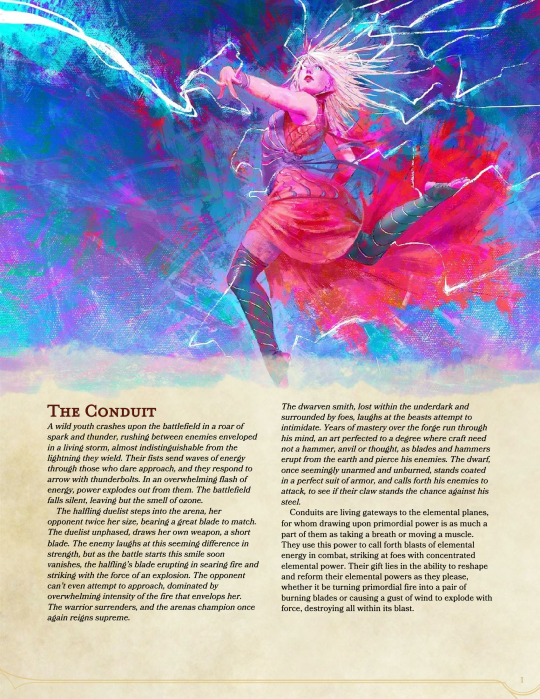
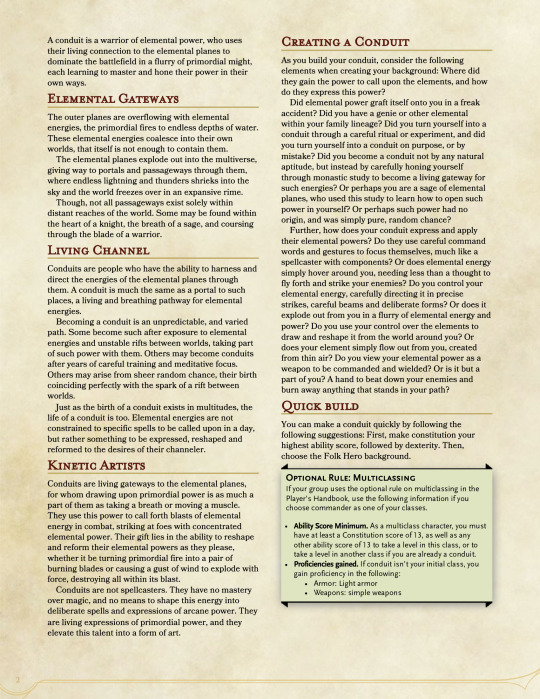
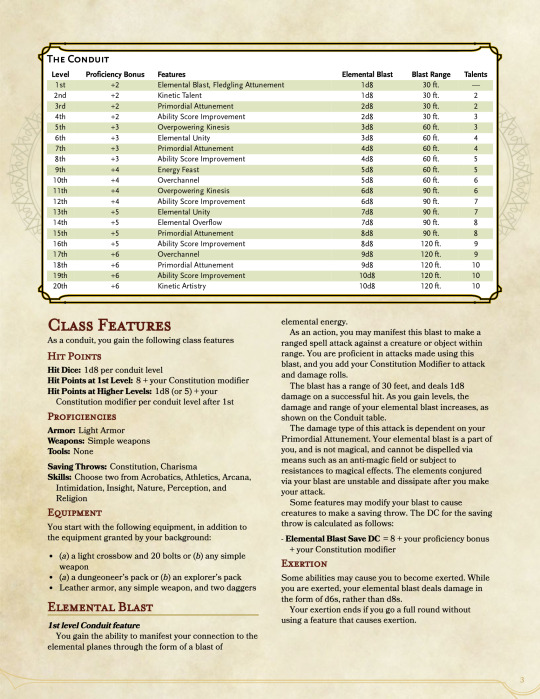
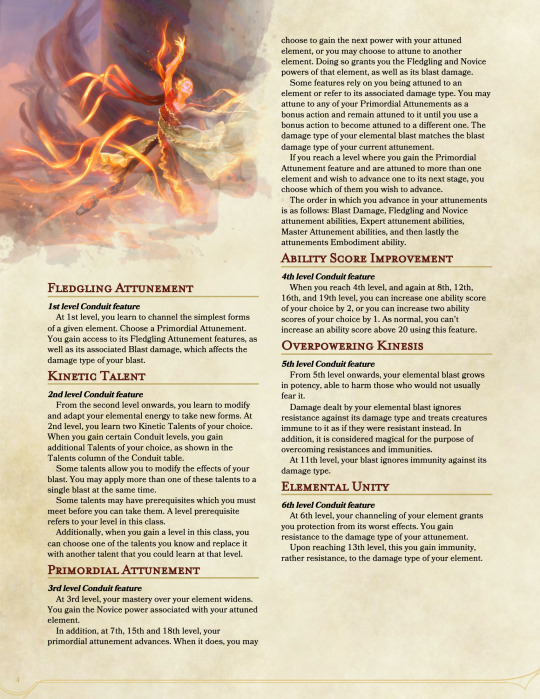

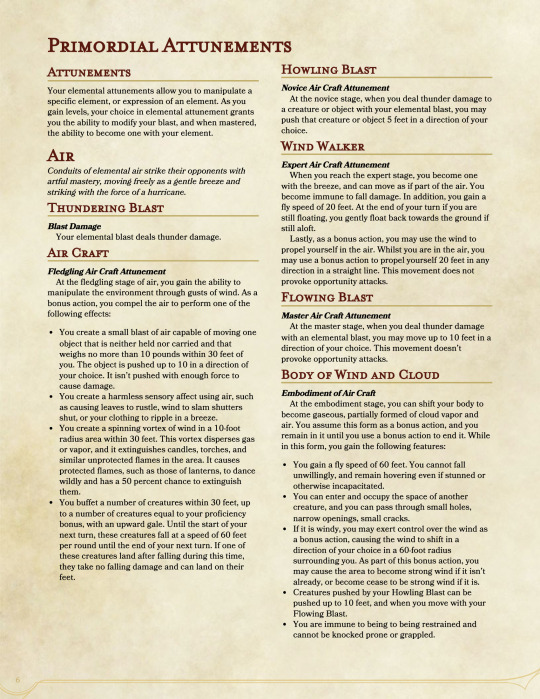



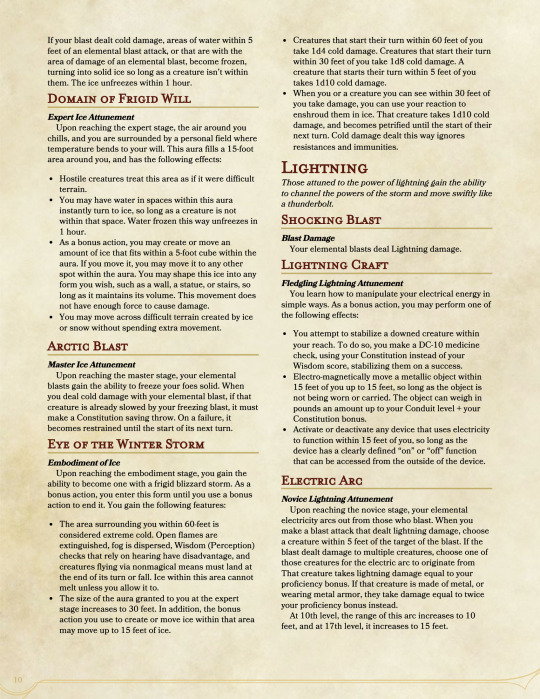
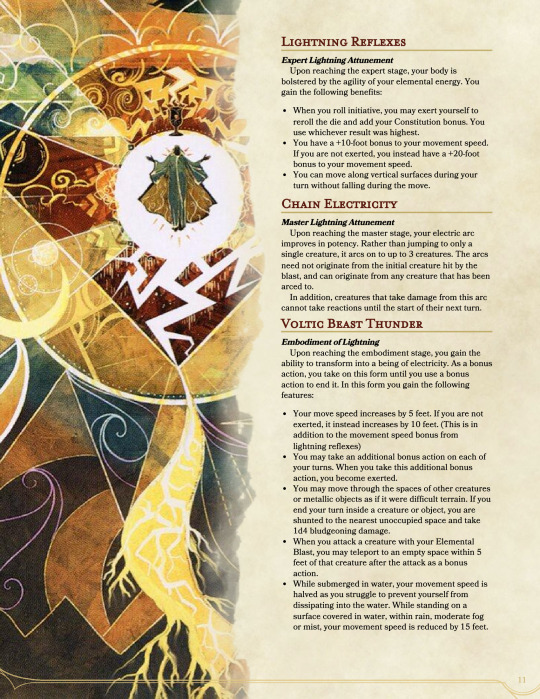
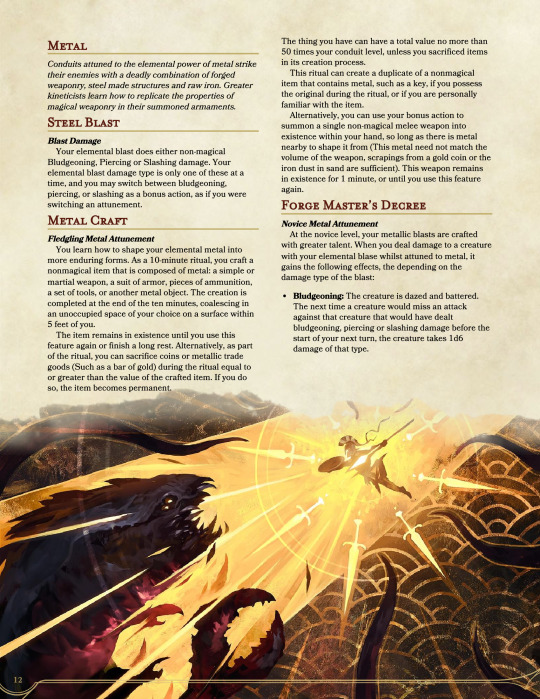
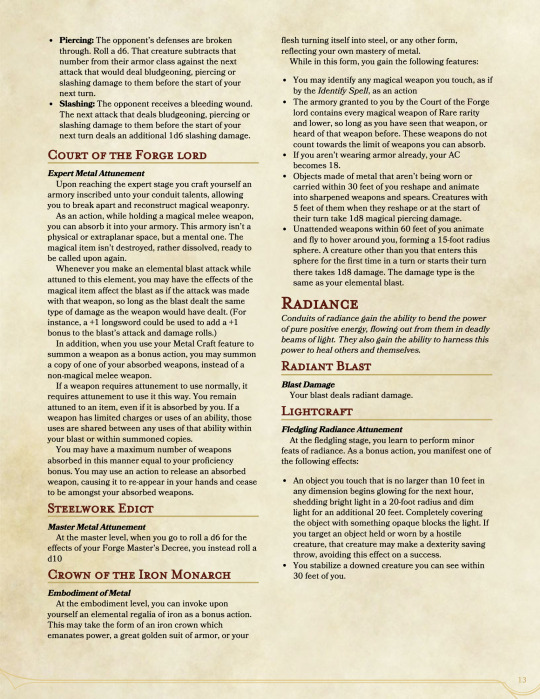

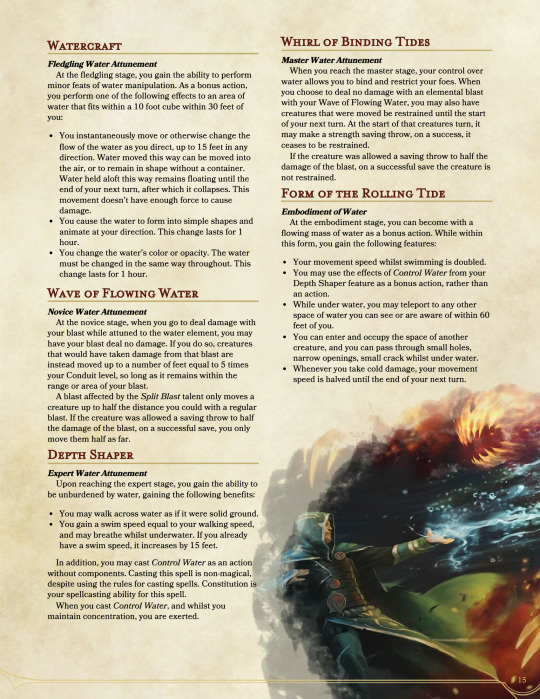
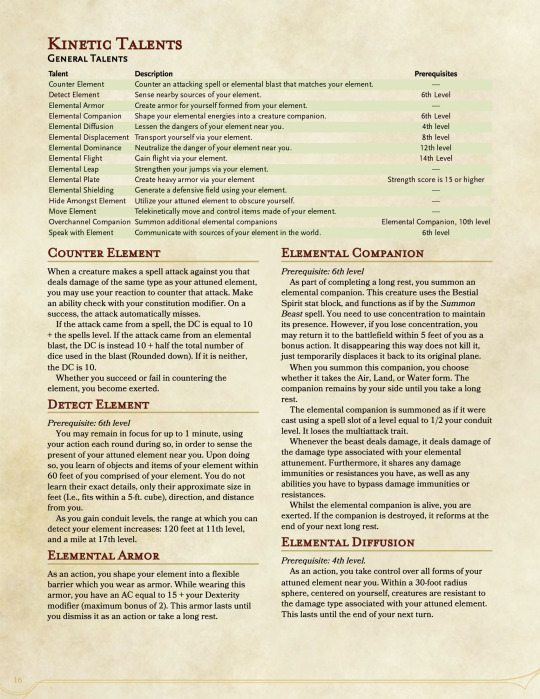
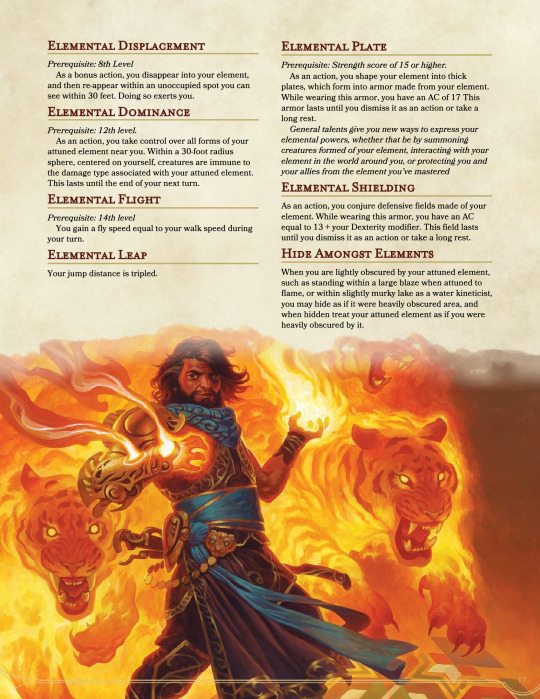
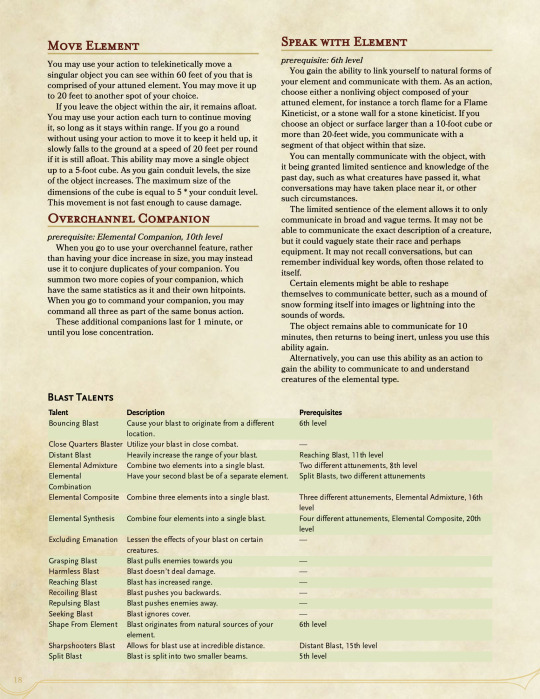
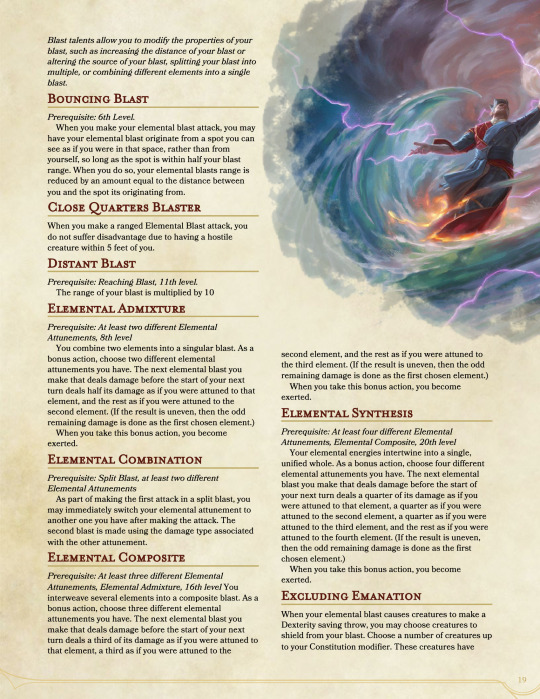
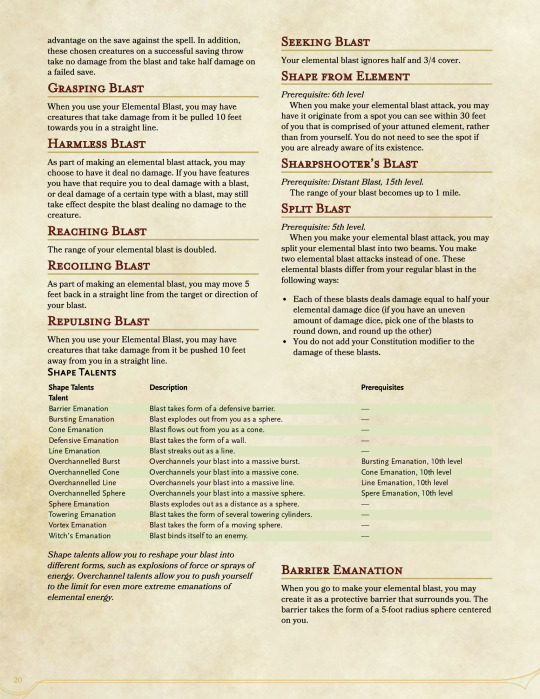

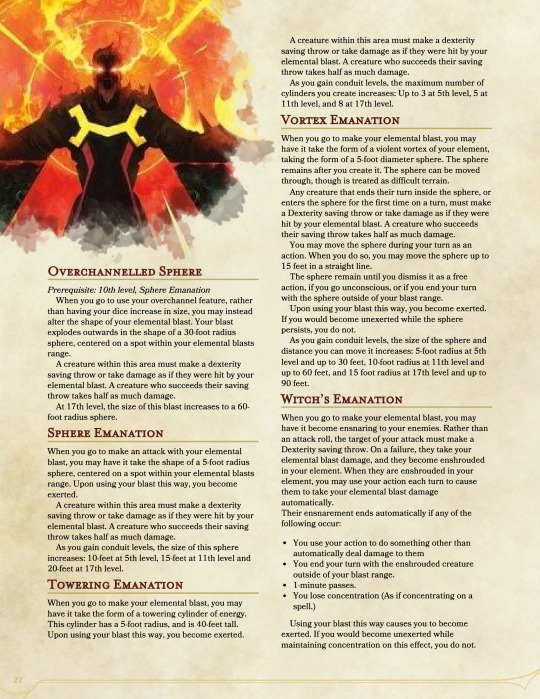
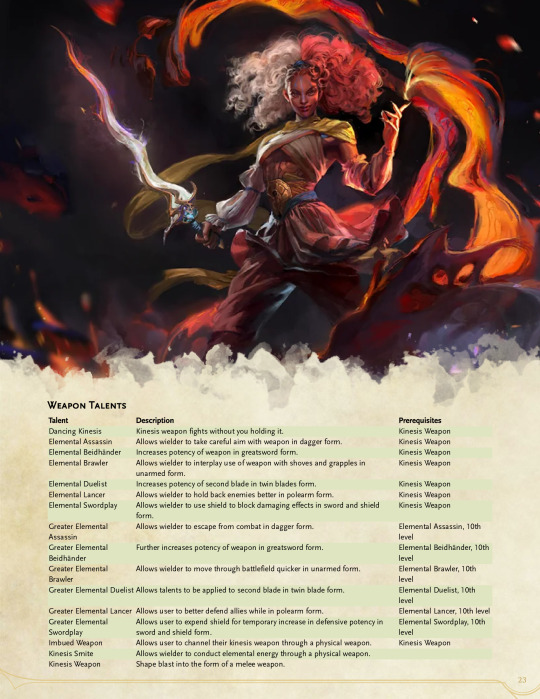

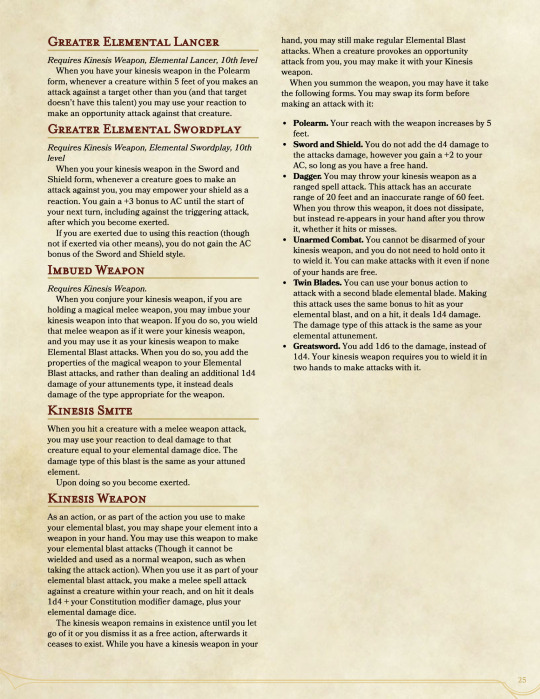

So heres the conduit! I'm very happy with how this turned out.
The conduit as a class is best described as a "Con Based Martial with spellcaster aesthetics", since, mechanically, it fills a martial role, being a class that doesnt use resources, with a primary party focus on dealing damage, while flavor wise, it goes around slinging blasts of energy at people.
This class mechanically is very much based on the warlock of 3rd edition, with flavour and some mechanical inspiration from the Kineticist of Pathfinder 2e.
The two core design elements that I tried to stick to with making this were 1. Being resourceless and 2. Customizability.
For the first point, none of the class features are limited in uses per day. No feature adds an additional resource for the player to track, nor uses spell slots nor etc. The closest it comes to a resource is its Exertion mechanic, where certain things tire out your conduit character. Though, this serves less as a resource, and more as a temporary debuff, reducing your damage output whilst its in effect, before being easily removed.
The second point is customizability. The first element of this is subclasses. Of course, theres the variety of subclasses to pick from, but notably, is that unlike other classes, you aren't bound to picking just one subclass. From 7th level onwards, whenever you reach your subclass feature level, you can choose to continue advancing in your subclass, or you can take the initial features of a different subclass. This means while you can do a more traditional route of going "I'm the lightning guy, I'm taking lightning every level", you can also do an avatar style "Master of 4 elements" and have 4 different subclasses by level 20. Mix and match them as you like, be the "Fire and Lightning" person, be the "I control water mostly, but also a little bit of ice", combine your elements and so forth.
The next part of customizability is in talents. Talents are very much your classic invocation style feature, of which there are... like. 60 of them at this point. But! Theres a lot of variety in what they do. While you have your choices of ones that give additional powers, like flight or teleportation or whatnot, a large bulk of them are dedicated to one thing: Reshaping your elemental blast. Go out there as a fire guy and blast people with fire, then turn around and literally explode everything around you in flames, then focus your blast into a roaring line of fire that pushes everything within it towards you, and then rush the last man standing with a spear made of literal fire.
The talents are designed around not just being able to reshape and modify your blast in a bunch of different ways, but you can combine them together and do cool stuff.
Because at its core, I wanted to design this class to fill a very specific style of fantasy, and thats of the type of magic you see in some settings where its just "I control this one element", and then from that the mage turns that into a billion different things.
A fire wizard will say "I can cast fire bolt, fire ball, and scorching ray". A fire conduit instead just has an elemental blast, but they can turn that elemental blast into a bolt that is hurled at one person, or have it explode into a ball of flame, or split it into multiple beams.
Its very much a creativity first subclass, and thats whats behind its capstone! The capstone is all of this at its epitomy, the ability to freely reshape your elemental power (By freely, temporarily learning talents) into whatever form you imagine.
Hell, customizability is built even into the very core of its flavour
Yeah <3
I hope you guys enjoyed reading this class as much as I enjoyed writing it and as much as I enjoy talking about it <3
172 notes
·
View notes
Text
The 500 gold that Percy handed over to Vex within 6 hours of meeting her lives rent free in my for so many reasons besides it simply being cute.
While it might not be obvious from the rest of Campaign 1, partly because we're used to these characters at mid to high levels and partly because they converted over from Pathfinder, but having that much raw gold ... as a likely only a 2nd or 3rd level character ... on their own with no party ... after accounting for the cost of gear, armor, and weapons ... it's a little crazy. For reference the starting wealth for the Gunslinger class in Pathfinder 1st edition is 5d6 x10 gold which is 175 gold on average.
From an inside the story perspective it's even wilder. Percy is going from a prolonged semi-dissociative state working on a fishing boat to few years later having iterated all the to a (mostly) working prototype of a new weapon and ammunition ... and been traveling to track Ripley for a long time ... and somehow still have the equivalent of over a years worth of the average commoner NPCs earnings in his pocket to just hand over.
Percy what jobs were you doing to support that? You were doing things that are expensive and time consuming. Any issue on making the List could be dozens of gold and days or weeks of work. He couldn't just wander into any random town and expect to be able to pick up regular work that could accommodate this. You are not blacksmithing and saddlemaking your way across the land and affording that, buddy.
There are only a few things besides “adventuring” that could really work here and ALL OF THEM are very interesting options.
#percy de rolo#percival de rolo#vox machina#the legend of vox machina#critical role#tell me your unhinged theories
27 notes
·
View notes
Text
Book Review: Pathfinder 1E Bestiary
And so we’re back again with another round of book reviews, looking at the various books and supplements I’ve collected over the history of the game, and this time we’re starting the week with the second half of the two books you’re assumed to have in order to play the game: the first monster book, the Bestiary!
Monster books have been a part of ttrpgs for a very long time, since the beginning, in fact. While not every system has or needs a dedicated book for the statistics of whatever horrible monsters exist out there in the game’s world, they certainly are convenient as a way to provide an arsenal of baddies for the heroes to face.
Again, much like last time when we covered the core rulebook of Pathfinder First Edition, we’ll inevitably have to talk about the changes the system made to it’s 3.5 D&D predecessor, but given that this is the last “core” book, we won’t be doing that in the future since books like this one have set the precedent.
In any case, let’s take a deep dive into the Bestiary!
Starting us off, the monsters in the first Bestiary, most of which are old D&D mainstays with a heaping helping of Pathfinder originals from the first few adventure paths thrown in, which makes sense. There’s even a few beasties from the 3rd party Tome of Horrors books, which took lots of monsters from earlier editions of D&D that WotC wasn’t really using or had control over and brought them into the forefront. Also returning was the 3.5 mainstay in the form of templates used for modifying statblocks as well, such as making skeletons out of everything, or depicting every creature with blood relations to dragons, celestials, and fiends.
In any case, if this bestiary could be said to have a theme, it would mostly be “bringing the D&D staples forward”, which they did, converting them over into the Pathfinder paradigm, consolidating the elemental an giant types into subtypes of outsider and humanoid, respectively. We even get to see the seeds planted for major paradigm changes, like seeing what we called kytons being rewritten from being devils to being their own whole outsider type and ogre mage being made into true oni and not just a rebranded “relative” of ogres.
Many of these monsters, while updated, maintain their old classic abilities. However, there are some tweaks here and there. Basilisk petrification being reversable by killing it and using the blood on the stone bodies is a brilliant way to keep the threat of petrification on such a low-level monster while softening the blow so that it’s no longer a party killer or massive inconvenience for low-level parties.
Organization-wise, the Bestiary has a massive improvement to the old Monster Manual formula from 3.5, and that is that individual monster entries are limited to one or two pages. This makes the consolidated statblocks easier to reference instead of having to thumb back and forth between two or more pages in the middle of a battle, and it even gives nearly every monster a chance to have it’s own art in the books. (You’d be forgiven for thinking that Derro were a Pathfinder creation, but they were in 3.5 too, but you’d never notice because they had no art and their description was so lackluster that nobody would ever bother using them)
And like any good monster book, there’s an appendix of rules for things they didn’t want to have to reprint every single time they wanted to use the same ability or subtype with unified traits, as well as guidelines for making your own monsters from scratch, which is super important. I mean, can you imagine a system that makes you buy a whole separate book just to have exact guidelines for how to make your own monsters? (Looks meaningfully at the 2E Gamemastery Guide)
A major positive in this book is the artwork. The cover art for the Bestiary sets a trend we’ll see throughout 1E in that the art takes three monsters within together that collectively set the tone for what sort of monsters you’ll find within. In this case a troll, marilith demon, and of course the iconic Pathfinder goblins, setting up the theme of the book being primarily classic monsters from the system that Pathfinder is derived from.
Inside the cover, we find that the art does a lot to really bring each monster to life, and for the most part the monsters are easily recognizable yet distinctive from their D&D counterparts in ways that for the most part enhance them. I distinctly remember my jaw dropping when seeing the bone devil illustration, which is miles above the 3.5 version in the awesome factor.
Of course, they’re not all winners, at least in my opinion. The choker, for example, just doesn’t hit the same as the tentacle-armed horror from 3.5
Less a weakness in the art and more a bit of whiplash though, is the dragons. If you’ve been playing 3.5 and earlier editions, you probably have a distinct idea about what each dragon species looks like. Black dragons have the big forward-pointing horns growing from the sides of their heads, metallic dragons have semi-flexible supports for their wings as opposed to the more bat-like chromatic dragons, and whatnot. It took some getting used to, looking at the entry for gold dragons and not seeing the barbel-faced, partially eastern lung dragon-inspired gold dragon, but a much more generic design. That isn’t to say that Pathfinder dragons aren’t distinctive, and I understand why, but it was an adjustment.
Overall, this book has a lot going for it. As the first monster book in the system, the Bestiary sets itself up nicely as an inheritor to 3.5, with plenty of improvements and refinements alongside the familiar creatures we’ve come to expect.
That ends up being a double-edge sword though, as the book barely has any new monsters, all the excitement being for monsters we all already know about, albeit reimagined visually somewhat. Also, the book has a handful of what can be described as “pinup art” for certain feminine, attractive monsters like lillends, dryads, and sphinxes, which may put off some folks, and does nothing to dispel the old stereotype of ttrpg players being repressed and horny teenagers (and adults that never got over being repressed and horny). But if that doesn’t bother you then it doesn’t bother you. In any case over the years Pathfinder got better about this, so that even the pretty monsters were not overly sexualized.
In any case, that about does it for today. The Pathfinder 1E Bestiary does it’s best to offer us some fun monsters with which to populate our game worlds with, though most we’ve seen before. Tune in tomorrow, however, for more books reviewed, starting with continuing our look into the first Adventure Path!
8 notes
·
View notes
Text
Firebird
A red and purple bird with a long tail that flows like a wave of flame, firebirds are celestial beings that bring succour and warmth to those in need. They will find adventuring parties that compliment their goals, or ones who they believe can be reformed, and assist them in achieving works of great good. Those lost in the dark and cold are relieved to see a firebird, as its very presence provides the light and warmth needed for survival. A firebird's feather sheds light for a year after removal, and the birds will often gift them to those who have done good for it, acting as proof of their meeting. Specialized feathers can also be planted in secretive locations, which burst into new firebirds after a year, fully grown and ready to take up their duties in protecting the vulnerable.
Inspired by the Tome of Beasts 1. This post came out a week ago on my Patreon. If you want to get access to all my monster conversions early, as well as access to my premade adventures and other material I’m working on, consider backing me there!
Pathfinder 2e

Firebird Creature 4 Small, Celestial Perception +14; truesight Languages Common, Elven, Empyrean, Fey Skills Acrobatics +12, Arcana +11, Deception +13, Medicine +10, Nature +10, Religion +10 Str +1, Dex +4, Con +2, Int +3, Wis +2, Cha +5 Light of the World (aura, light) 5-20 feet. The firebird sheds bright light in the aura, and dim light for the same radius. As an action with the concentrate trait, it can change the size of this aura to any range between 5 and 20 feet. A feather plucked from the firebird sheds light as a torch for 1 hour. Warming Presence (aura, divine) 5 feet. The firebird and all creatures in the aura treat environmental cold effects as if they were one step less extreme (incredible cold becomes extreme, extreme cold becomes severe, and so on). AC 20; Fort +10, Ref +12, Will +12 HP 65; Immunities fire, frightened; Resistances electricity 5 Speed 20 feet, fly 100 feet Melee beak +12 (finesse), Damage 2d6+3 piercing Melee talon +12 (agile, finesse), Damage 2d4 +3 slashing Innate Divine Spells DC 21 ; 3rd heal, hypnotize; 2nd revealing light (×3); 1st charm (×3), cleanse cuisine (at will); cantrips (2nd) guidance, light Constant speak with animals, truesight Divine Rituals DC 21; geas Blinding Ray [2 actions] (divine, fire, light) The firebird throws a burning ray of light from its tail feathers that deals 5d6 fire damage in a 50-foot line (DC 18 basic Reflex save). A creature that fails the save is also blinded for 1 round, or blinded for 4 rounds on a critical failure. The firebird can't use Blinding Ray again for 1d4 rounds.
13th Age

Firebird 2nd level leader [beast] Initiative: +7 Beak and Talons +7 vs. AC – 6 damage. Natural 14+: The firebird gives one nearby ally a +1 bonus to its next attack roll before the end of the firebird’s next turn. C: Blinding Ray +7 vs. PD (1d3 nearby enemies in a rough line) – 3 fire damage. Natural 14+: The target is also dazed until the end of the firebird’s next turn. Natural 18+: The target is dazed and hampered until the end of the firebird’s next turn. Limited Use: 1/battle, recharges the first time the escalation die reaches 5+. Flight. Resist Fire 16+. Warming Presence: The firebird and all of its nearby allies have resist cold 14+. AC 17 PD 15 MD 14 HP 34
#pathfinder 2e#13th age#homebrew#my homebrew#monster#beast#celestial#pathfinder level 4#13th age level 2#tome of beasts#long post
7 notes
·
View notes
Text
promo crosspost for my friend marcy! she doesn't use this site anymore, but please give her work a peek, especially if you're a ttrpg enthusiast. trihex is super promising!
11 notes
·
View notes
Note
you said you liked pathfinder right? assign your sisters classes but only using 3rd party published material
"Only 3rd party published material" suggests no third-party archetypes for official classes, and no unpublished stuff I made myself. In that case...
Me: Stalker/Umbral Blade. Necroknight is also an option, and Crimson Countess would be neat as well if it was not anger-fueled. Very vampiric.
Other me: Aegis or Warlord (possibly with the Bannerman archetype).
Jade: Helmsman if we can give her a mech. Otherwise probably something like Machinesmith.
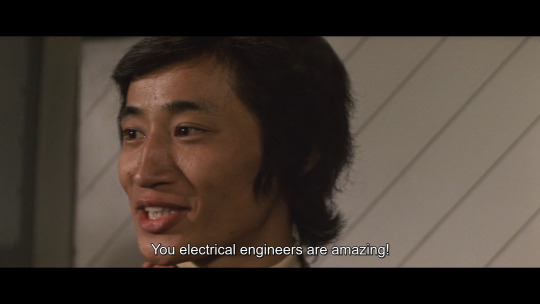
Lottie: Maybe Runecaster?
Master: Probably a Warder or especially a Beastmaster.
2 notes
·
View notes
Text
LFG among Otherkin
Hello, everybody. I happen to be making a dnd campaign (not really dnd, its pathfinder 2e but same basic idea just better) and i want to run it for a bunch of otherkin. The game system by default has playable fairies, vampires, leshies, cat people, hyena people, etc, BUT I also have a 3rd party books for us DRAGONS. Its also gonna get awakened animals soon-ish. Wanna play your kintype? because i'd like to, but i'll be the one GM-ing. PM me if interested. <3
12 notes
·
View notes
Note
Tell me about 5, Ilan :3c
- Circ
Ilan is an anumus, which is a pathfinder 1e 3rd party race, though I forgot which 3rd party publisher... anumi were once beloved pets which were fed a magical fruit before dying, gaining consciousness and self awareness, and becoming a human with the head of the animal in the process. Ilan was a snake, and so is a human with the head of a snake!
#sadly ilan is my least favourite character#i never really hit it off with him yk i like him but i never grew too fond of him#also hi circ! glad to see you here <3#d&d#pathfinder 1e#ttrpg#pf1e
2 notes
·
View notes
Note
Been on a binge of rereading one of my favorite shonen manga series, and got inspired to ask this because it's actually related to a thing I'm writing: How would you say characters from that kind of battle media would compare *physically* in Pathfinder? I specify *physically* because magic makes things go weird, even if we put the reality-altering power of Wish off the table. Greater Teleport, Plane Shift, Dominate Person... most of that power isn't in direct confrontation, but rather ending the fight the moment, or before it even begins. On the other hand, d20 systems struggle from giving martials supremely world-altering power through raw might. A +47 to hit on eleven attacks every six seconds is nuts to be sure and can absolutely end a fight the moment the enemy gets in range, but it doesn't have the flair of 'I'm going to punch you so hard into the ground the entire city is going to be folded around you like a sandwich'. Or 'I am going to swing my sword, and proceed to cut this glacier in half from a quarter of a kilometre away'. Even at 30, 40 Str you just can't pull off those sorts of stunts. A Level 20 Barbarian is strong, to be sure, and with Mythic can do whack things like throw people into orbit (Limitless Range + Body Bludgeon my beloved), but overall there's not much 'spectacle' baked into combat in Pathfinder. You're usually limited to theatre of the mind or 3rd-party like Path of War. Which is, admittedly, excellent. but that's neither here nor there.
Bonus points if you know which series I'm talking about.
Pathfinder is, unfortunately, quite limited in what insane nonsense martial characters can do. Sure, when you're standing right next to someone, absolutely blending them with TWF is impressive... on paper. In practice, it relies a lot on the DM going full theater of the mind to make it match the spectacle of what Wizards can do.
I suppose that's the horrible price Pathfinder pays for being a relatively grounded and gritty fantasy setting instead of the off-the-wall shounen. A 20th level or, hell, even a 12th Fighter in Pathfinder is downright superhuman, but they're superhuman in a "medieval live-action fantasy" way, not a "logic-defying cartoon physics" way. I'm certain if a DM was willing to work with the player, they could pull off the same wacky/awe-inspiring stunts! But sadly, base Pathfinder has no feats that allow you to slash your sword so hard you can bisect an entire 300-foot long dreadnought. Yet.
25 notes
·
View notes
Text
You Don't Have to Play D&D
I'm not saying that you have to stop playing D&D, but its important to remember that no TTRPG deserves your undying brand loyalty.
Don't let any system restrict what you want to play at your table.
Homebrew and supplement the game like its your 100th playthrough of Skyrim and keep adding mods until it breaks!
If everyone is enjoying the game, it isn't because of "the brand".
Given all the 3rd party and system neutral content that exists out there nowadays, you don't ever need to buy an official book and still have an "authentic D&D experience".
Delving Dungeons and getting fantasy loot is what they wanted!
All my friends that wanted to "try D&D" didn't mind Pathfinder.
6 notes
·
View notes